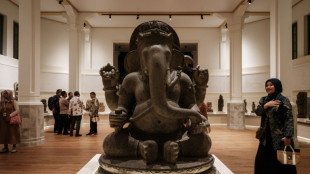
-
 Suspect in deadly Christmas market attack railed against Islam and Germany
Suspect in deadly Christmas market attack railed against Islam and Germany
-
At least 32 die in bus accident in southeastern Brazil

-
 Freed activist Paul Watson vows to 'end whaling worldwide'
Freed activist Paul Watson vows to 'end whaling worldwide'
-
Chinese ship linked to severed Baltic Sea cables sets sail

-
 Sorrow and fury in German town after Christmas market attack
Sorrow and fury in German town after Christmas market attack
-
Guardiola vows Man City will regain confidence 'sooner or later' after another defeat

-
 Ukraine drone hits Russian high-rise 1,000km from frontline
Ukraine drone hits Russian high-rise 1,000km from frontline
-
Villa beat Man City to deepen Guardiola's pain

-
 'Perfect start' for ski great Vonn on World Cup return
'Perfect start' for ski great Vonn on World Cup return
-
Germany mourns five killed, hundreds wounded in Christmas market attack

-
 Odermatt soars to Val Gardena downhill win
Odermatt soars to Val Gardena downhill win
-
Mbappe's adaptation period over: Real Madrid's Ancelotti

-
 France's most powerful nuclear reactor finally comes on stream
France's most powerful nuclear reactor finally comes on stream
-
Ski great Vonn finishes 14th on World Cup return

-
 Scholz visits site of deadly Christmas market attack
Scholz visits site of deadly Christmas market attack
-
Heavyweight foes Usyk, Fury set for titanic rematch

-
 Drone attack hits Russian city 1,000km from Ukraine frontier
Drone attack hits Russian city 1,000km from Ukraine frontier
-
Former England winger Eastham dies aged 88

-
 Pakistan Taliban claim raid killing 16 soldiers
Pakistan Taliban claim raid killing 16 soldiers
-
Pakistan military courts convict 25 of pro-Khan unrest

-
 US Congress passes bill to avert shutdown
US Congress passes bill to avert shutdown
-
Sierra Leone student tackles toxic air pollution

-
 German leader to visit site of deadly Christmas market attack
German leader to visit site of deadly Christmas market attack
-
16 injured after Israel hit by Yemen-launched 'projectile'

-
 Google counters bid by US to force sale of Chrome
Google counters bid by US to force sale of Chrome
-
Russia says Kursk strike kills 5 after Moscow claims deadly Kyiv attack

-
 Cavaliers cruise past Bucks, Embiid shines in Sixers win
Cavaliers cruise past Bucks, Embiid shines in Sixers win
-
US President Biden authorizes $571 million in military aid to Taiwan

-
 Arahmaiani: the Indonesian artist with a thousand lives
Arahmaiani: the Indonesian artist with a thousand lives
-
Indonesians embrace return of plundered treasure from the Dutch

-
 Qualcomm scores key win in licensing dispute with Arm
Qualcomm scores key win in licensing dispute with Arm
-
Scientists observe 'negative time' in quantum experiments

-
 US approves first drug treatment for sleep apnea
US approves first drug treatment for sleep apnea
-
US drops bounty for Syria's new leader after Damascus meeting

-
 Saudi man arrested after deadly car attack on German Christmas market
Saudi man arrested after deadly car attack on German Christmas market
-
'Torn from my side': horror of German Christmas market attack

-
 Bayern Munich rout Leipzig on sombre night in Germany
Bayern Munich rout Leipzig on sombre night in Germany
-
Tiger in family golf event but has 'long way' before PGA return

-
 Pogba wants to 'turn page' after brother sentenced in extortion case
Pogba wants to 'turn page' after brother sentenced in extortion case
-
Court rules against El Salvador in controversial abortion case

-
 French court hands down heavy sentences in teacher beheading trial
French court hands down heavy sentences in teacher beheading trial
-
Israel army says troops shot Syrian protester in leg

-
 Tien sets-up all-American NextGen semi-final duel
Tien sets-up all-American NextGen semi-final duel
-
Bulked-up Fury promises 'war' in Usyk rematch

-
 Major reshuffle as Trudeau faces party pressure, Trump taunts
Major reshuffle as Trudeau faces party pressure, Trump taunts
-
Reggaeton star Daddy Yankee in court, says wife embezzled $100 mn

-
 Injured Eze out of Palace's clash with Arsenal
Injured Eze out of Palace's clash with Arsenal
-
Norway's Deila named coach of MLS Atlanta United

-
 Inter-American Court rules Colombia drilling violated native rights
Inter-American Court rules Colombia drilling violated native rights
-
Amazon expects no disruptions as US strike goes into 2nd day


No longer Assad's mouthpiece, Syrian media face uncertainty
Syrian media outlets which trumpeted the glories of Bashar al-Assad's oppressive rule quickly adopted revolutionary fervour after his ouster, but uncertainty shadows the sector.
For decades, Syria's ruling Baath party and the Assad family dynasty heavily curtailed all aspects of daily life, including freedom of the press and expression.
The media became a tool of those in power.
When a rebel alliance led by Islamist group Hayat Tahrir al-Sham (HTS) took Damascus on December 8, announcing Assad's overthrow after an 11-day offensive, confusion reigned and state news agency SANA, the government mouthpiece, went silent for more than 24 hours.
State television broadcast old programmes instead of the fast-evolving events. Then a group of men in the news studio read a statement from the "Damascus Conquest operations room". They announced "the liberation of the city of Damascus and the fall of the tyrant Bashar al-Assad".
Those words would have been unimaginable two weeks earlier.
For hours, the channel then broadcast a full-screen message on a red background announcing the "victory of the great Syrian revolution".
Foreign media -- whose entry to the country was heavily restricted under Assad -- flooded in as soon as he was toppled, rushing to notorious prisons and other sites that were out of reach under his paranoid rule.
- 'Not guilty' -
After Syria's war erupted in 2011 with the government's brutal repression of pro-democracy protests, Assad tightened restrictions on independent journalism. He expected adherence to the government narrative.
Few reports of the fast-moving rebel offensive initially appeared on official media, and no military comment was allowed except from the army as rebels swept up government-held territory.
Upon Assad's ouster, journalists -- particularly in state media -- quickly changed their online profile photos to pro-revolutionary images and removed anything demonstrating their involvement with the former authorities.
SANA the following day changed its cover picture on messaging app Telegram to match the three-star flag symbolic of Syria's uprising. The agency began publishing news including announcements from the rebels' military operations room.
Private pro-government publication Al-Watan -- relatively critical compared to other outlets -- on the day the rebels took Damascus published a statement defending itself.
"Syrian media and media workers are not guilty," it said.
Like other outlets, the daily was "only carrying out instructions and publishing the news (the government) sent us. Quickly it became clear it was false", wrote editor-in-chief Waddah Abd Rabbo.
Al-Watan, established in 2006, has since published news from the new administration, and Abd Rabbo said officials from the information ministry "told us our team could continue working".
"We hope in future that we can return to print, particularly because Syria is the only country that doesn't print a single newspaper," he told AFP by telephone.
All Syrian newspapers halted print publication during the Covid-19 pandemic.
- 'Unknown future' -
Some other local media platforms have been gradually returning to work or relaunching, including private television channel Sama, which was funded by Syrian businessman and lawmaker Mohammed Hamsho.
One employee, requesting anonymity due to security concerns, said civilian members of HTS -- accompanied by armed rebels -- entered the station and told employees to return.
Other outlets have not, including private radio station Sham FM, which initially said it was suspending news and information programming "until the general situation becomes stable".
Two days later the station, which launched in Damascus in 2007, announced it was ceasing production "following a decision from the Ministry of Information in the transitional government."
"I have around 70 employees" who in turn have families, said founder and general manager Samer Youssef, adding that "thousands of people worked in the media" under Assad.
"An unknown future awaits us and all media who worked under the control of the old regime," he told AFP.
Reporters Without Borders, a freedom of information watchdog, ranked Syria second-last on its World Press Freedom Index this year, ahead of Eritrea, and behind Afghanistan.
The new administration in Syria has not necessarily reassured the media.
On December 13, the Information Ministry released a statement saying "media workers who were part of the war and propaganda machine of the fallen Assad regime, and contributed directly or indirectly to promoting its crimes," would be "held to account".
Bassam Safar, head of the Damascus branch of the anti-Assad Syrian journalists' union, which was previously based abroad, said no media worker can be held to account "unless it is proven that they took part in the bloodshed."
That, he said, "is the business of the courts."
For him, the Syrian people should reconcile with their journalists, to establish "a new media environment built on freedom" and human rights.
P.Mira--PC
